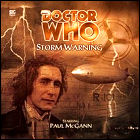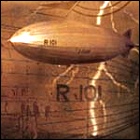 The Doctor happens upon a recursive disaster in the time vortex – a timeship whose fiery demise is repeating itself over and over again, leaving the vessel helpless to fend off the attack of vortex-dwelling creatures swarming over the wreck. The Doctor impetuously tries to nudge the timeship out of its predicament, putting the TARDIS in danger of joining it in its never-ending fate. The gambit works, but when the Doctor makes a hasty emergency exit of the vortex, vortizores follow the TARDIS to its destination: Earth, 1930, aboard the doomed maiden voyage of British Airship R-101. The Doctor becomes stranded aboard the ship – which history records as having crashed in France on its first flight with all hands lost – when the TARDIS, having landed in one of the ballast tanks, is dumped overboard. He then meets stowaway Charlotte Pollard – “Charley” for short – who boarded the R-101 in the guise of a steward, but has now been found out and is on the run. Lord Tamworth, the Minister of the Air, is also aboard, as is the dirigible’s nervous designer, fearful of the changes that Tamworth made to his specifications. And in Cabin 43, a heavily-sedated passenger is kept in isolation, though someone aboard the craft has made arrangements to return her home…to an alien space vehicle at an altitude of 5,000 feet.
The Doctor happens upon a recursive disaster in the time vortex – a timeship whose fiery demise is repeating itself over and over again, leaving the vessel helpless to fend off the attack of vortex-dwelling creatures swarming over the wreck. The Doctor impetuously tries to nudge the timeship out of its predicament, putting the TARDIS in danger of joining it in its never-ending fate. The gambit works, but when the Doctor makes a hasty emergency exit of the vortex, vortizores follow the TARDIS to its destination: Earth, 1930, aboard the doomed maiden voyage of British Airship R-101. The Doctor becomes stranded aboard the ship – which history records as having crashed in France on its first flight with all hands lost – when the TARDIS, having landed in one of the ballast tanks, is dumped overboard. He then meets stowaway Charlotte Pollard – “Charley” for short – who boarded the R-101 in the guise of a steward, but has now been found out and is on the run. Lord Tamworth, the Minister of the Air, is also aboard, as is the dirigible’s nervous designer, fearful of the changes that Tamworth made to his specifications. And in Cabin 43, a heavily-sedated passenger is kept in isolation, though someone aboard the craft has made arrangements to return her home…to an alien space vehicle at an altitude of 5,000 feet.
written by Alan Barnes
directed by Gary Russell
music by Alistair Lock / theme arrangement by David ArnoldCast: Paul McGann (The Doctor), India Fisher (Charley), Gareth Thomas (Lord Tamworth), Nicholas Pegg (Frayling), Barnaby Edwards (Rathbone), Hylton Collins (Chief Steward Weeks), Helen Goldwyn (Triskele)
Timeline: after the 1996 TV movie and before Sword Of Orion
LogBook entry and TheatEar review by Earl Green
Review: Many an expectation was riding on this four-parter, Paul McGann’s first swipe at dramatizing the Doctor once more since 1996. If anything, Storm Warning proves that McGann does, in fact, relish the role – we would not have been disappointed with the eighth Doctor had the 1996 movie been the starting point for a new series. (Whether or not we would’ve been disappointed with the series itself is another matter, and you can find grist for that mill in the excellent book, “Doctor Who: Regeneration” by Philip Segal and Gary Russell.)
 The guest cast is wonderful, with the magnificent Gareth Thomas making it most regrettable that he never got to guest on the television series. His voice, though more aged than it was during his days as Blake of Blake’s 7, is unmistakable, and his intensity does a lot to carry the story along, especially in parts three and four.
The guest cast is wonderful, with the magnificent Gareth Thomas making it most regrettable that he never got to guest on the television series. His voice, though more aged than it was during his days as Blake of Blake’s 7, is unmistakable, and his intensity does a lot to carry the story along, especially in parts three and four.
New companion Charlotte “Charley” Pollard is interesting, and in part four the Doctor realizes that something is amiss with her very presence. But more than that, I shall not say. The role is not a million miles away from actress India Fisher’s previous Doctor Who audio character, the impetuous Peril Bellamy in last year’s Winter For The Adept, but her forthright bravery (in the less-than-liberated 1930s, no less) makes her endearing. And I must admit, the mystery that surrounds her toward the end of the story is very interesting indeed.
The music and sound effects are of a very high quality, with Big Finish Productions perhaps being particularly aware that this story – with all of the attendant publicity of the first new Eighth Doctor dramatization in five years – would be under a great deal of scrutiny by fans (and Who fans are particularly picky about the show’s panoramic continuity and occasionally less-than-panoramic production values). The only thing I’m still iffy about is the new arrangement of the theme music by David Arnold (Independence Day, The World Is Not Enough). It’s very 90s in its electronic execution (complete with TARDIS sound samples in the background), but I almost would have preferred the John Debney orchestral arrangement  from the 1996 movie. However, due to budget and licensing arrangements with Universal (the studio which produced that movie), this was most likely impossible.
from the 1996 movie. However, due to budget and licensing arrangements with Universal (the studio which produced that movie), this was most likely impossible.
The story moves along at a great pace, with interesting characters, a bizarre alien species, and the weight of history pressing down on everyone’s back like a juggernaut. Even though we’re told, halfway through the first episode, how the story will end, it’s still a bit of a shock (and a great effects mix) when it finally happens in episode four. And I think I detected an ever-so-slight nod in the direction of Titanic there – very similar story construction, with an inevitable outcome.
All in all, a great opening story for a new “season” of Audio Adventures. What with all of that publicity, this story was a pivotal make-or-break moment for Big Finish’s Doctor Who license, and I think they made it.
